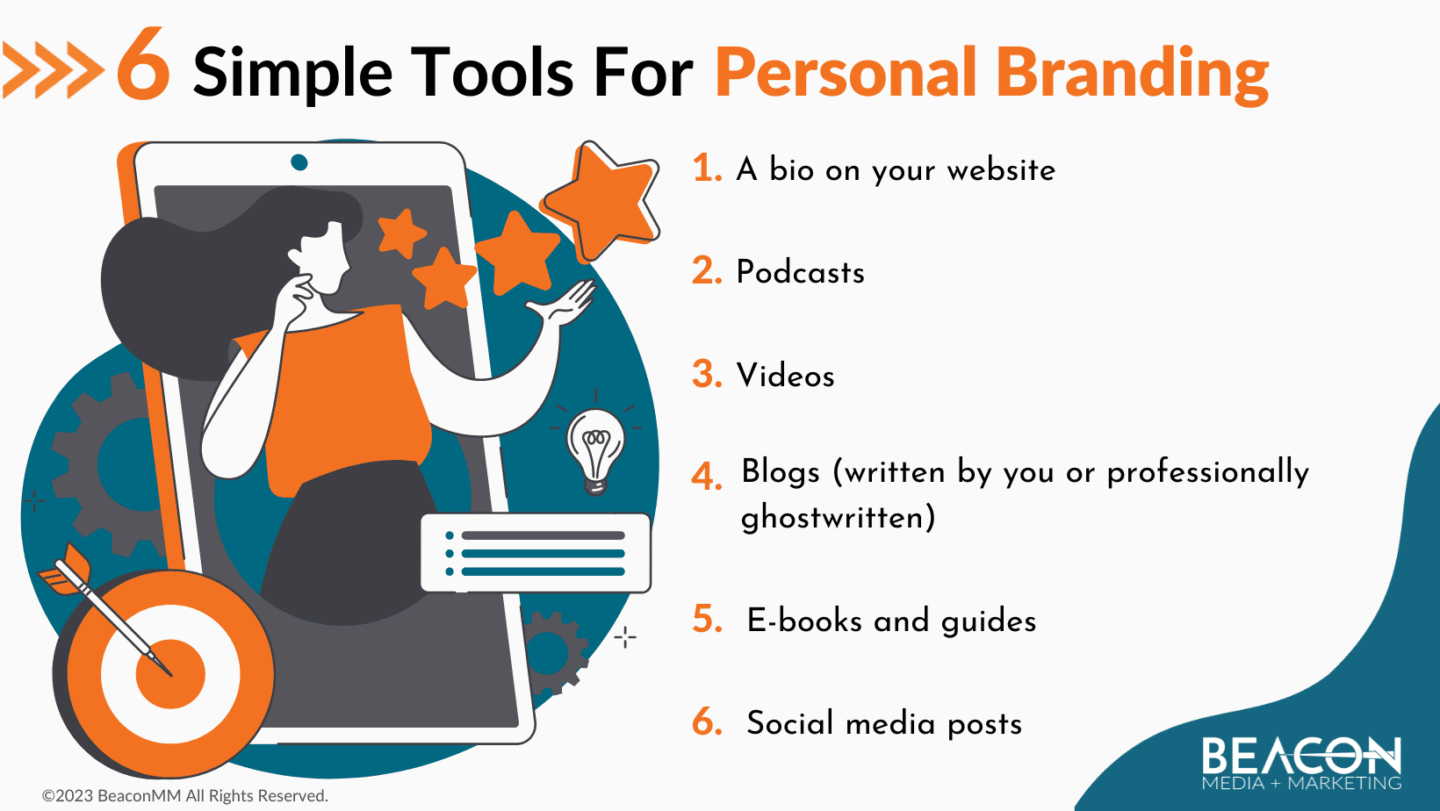Originally written by Jeremiah Blanchard, Beacon Content Lead. Updated and revised by Sara Jokela 12/23/24.
When you think of any well-known or popular brands on the market, you likely have a related image in your mind along with how you view that brand’s reputation. For instance, if you think of Nike, Gucci, or even Starbucks, you can probably envision their logo and your perception of the brand itself – also known as brand recognition.
While brand recognition and marketing are critical for any brand to become recognized and successful, so is personal branding. Establishing a clear brand identity is essential because your individual presence can also have a huge impact on your business and your client volume – and be helpful if you ever want to expand your practice.
As a therapist in the mental health space, it’s just as important for you to create a platform for yourself as it is for your practice. And as you’re likely the face of your practice, knowing how to showcase yourself in the best light is going to be integral to your overall success.
But how do you develop personal branding from a multi-faceted marketing approach? And what are consumers really looking for that will set you apart from other clinics?
Could you use help with personal branding for your therapy practice? Contact Beacon Media + Marketing today for a free consultation
What is Personal Branding?
Definition of Personal Branding
Personal branding refers to the process of creating and establishing a unique identity for an individual, in this case, a therapist, to differentiate themselves from others in their profession. It involves developing a consistent image, message, and values that reflect their expertise, personality, and approach to therapy. A strong personal brand helps therapists establish trust, credibility, and recognition with their target audience, ultimately leading to increased visibility, opportunities, and success.
Importance of Personal Branding for Therapists
In today’s competitive market, personal branding is crucial for therapists to stand out and attract clients. A well-crafted personal brand helps therapists:
- Establish a unique value proposition and differentiate themselves from others
- Build trust and credibility with potential clients
- Increase visibility and recognition in their field
- Attract their ideal clients and grow their practice
- Develop a consistent message and image that reflects their expertise and approach
- Enhance client engagement and increase sales by building a strong personal brand that resonates with your target audience
By investing in personal branding, therapists can take control of their professional image, build a loyal client base, and achieve their business goals.
Benefits of Personal Branding for Therapists
Personal branding is essential for therapists to establish themselves as experts in their field, build trust with potential clients, and differentiate themselves from competitors. By developing a strong personal brand, therapists can:
- Increase Online Visibility and Credibility: A well-crafted personal brand enhances your presence on digital platforms, making it easier for potential clients to find and trust you.
- Attract More Clients and Grow Your Practice: A unique and authentic brand helps you stand out, drawing in clients who resonate with your approach and values.
- Establish Yourself as a Thought Leader: Sharing your insights and expertise through your brand positions you as a leader in your niche, attracting opportunities for speaking engagements, collaborations, and more.
- Build a Loyal Community: A strong personal brand fosters a sense of connection and loyalty among your clients, turning them into advocates who refer others to your practice.
- Increase Earning Potential and Career Opportunities: As your brand grows, so do your opportunities for higher earnings and career advancements, whether through expanding your practice or exploring new ventures.
What Exactly Are Consumers Looking For?
With such an emphasis being placed on policing misinformation in the modern digital era, many customers and consumers are keenly aware that the likelihood of being misled is fairly high – even in the health and wellness space. And this is why many consumers are seeking out profiles, credentials, bios, and other content that is going to tell them your story – or at least content that will let them know that you’re who you say you are.
For example, you don’t have to be a medical doctor to have a website claiming that you are. Though this would be a great example of fraudulent business practice, the fact remains that because the Internet is so vast and full of misinformation, you’ll want to ensure that your potential clients can trust you – and that you’re the real deal.
In addition, consumers are also actively seeking out content on social media, podcasts, blog posts, and client reviews about therapists. This is because your face and your story are important for building the foundation of trust – the first building blocks of any relationship.
Understanding Your Target Audience
Identifying Your Ideal Client
To create an effective personal brand, it’s essential to understand who your ideal client is. This involves identifying their demographics, needs, preferences, and pain points. By gaining insights into your target audience, you can tailor your branding, marketing, and services to meet their expectations and build a loyal client base. By treating your personal branding efforts as a structured project, you can ensure that each phase of development is carefully planned and executed.
To identify your ideal client, consider the following factors:
- Demographics: age, location, occupation, education level, etc.
- Needs: what are their specific needs and challenges related to therapy?
- Preferences: what type of therapy approach do they prefer? What are their values and beliefs?
- Pain points: what are their biggest challenges and concerns related to therapy?
By understanding your ideal client, you can create a personal brand that resonates with them, addresses their needs, and establishes you as a trusted and expert therapist in your field.
Understanding Their Needs and Pain Points
To create an effective personal brand, therapists need to understand the needs and pain points of their ideal clients. This involves:
- Conducting Market Research: Identify your target audience and their specific concerns by analyzing market trends and data. This helps you tailor your services to meet their needs.
- Analyzing Online Reviews and Feedback: Pay attention to what clients are saying about you and other therapists. This provides valuable insights into what clients are looking for and how you can improve your offerings.
- Identifying Unique Challenges: Understand the unique challenges and pain points your target audience faces. This allows you to address these issues directly in your branding and marketing efforts.
- Understanding the Client’s Journey: Map out the typical journey your clients take, from discovering your services to achieving their goals. This helps you create a brand that supports them at every stage.
Creating a Client Avatar
A client avatar is a detailed profile of your ideal client, including their demographics, goals, challenges, and behaviors. By creating a client avatar, therapists can:
- Develop a Deeper Understanding: Gain a comprehensive understanding of your target audience and their specific needs, allowing you to tailor your services and marketing efforts effectively.
- Create Targeted Marketing Campaigns: Use the insights from your client avatar to develop marketing campaigns that resonate with your ideal clients, increasing engagement and conversion rates.
- Develop Services and Programs: Design services and programs that address the specific needs and challenges of your clients, ensuring they feel seen and understood.
- Build a Loyal Community: When clients feel that you truly understand them, they are more likely to become loyal followers and advocates for your practice.
What Does a Personal Brand Identity Strategy Entail?
When it comes to personal branding, half of this is all about focused messaging. And the clearer and more authentic your message is to your target audience, the better the response will be.
Collaborating with experienced partners can provide valuable insights and resources to enhance your personal brand strategy.
Achieving measurable results is crucial, as it demonstrates the effectiveness of your branding strategy and enhances the value of your brand.
Let’s face it. Most of us know a phony when we see (or hear) one. And your potential clients are the same. It’s easy to spot a fake, and it’s just as easy to spot fake or inauthentic messaging. This is why working with a marketing company can be a huge asset for honing your message and delivering it to the world in the most honest way.
But in order to have a message, you also need a platform. And this is where you can leverage your website and social profiles to help deliver your message.
A few ways you can highlight your personal brand are:
- A bio on your website
- Podcasts
- Videos
- Blogs (written by you or professionally ghostwritten)
- E-books and guides
- Social media posts
All in all, a personal brand message contains a few essential elements that all work together. And these include delivering a focused message, being genuine, being consistent, seeking to create a positive impact, and leaving potential clients intrigued about you and your practice.
Once you incorporate these elements into your strategy, you’ll be setting yourself apart from the competition by highlighting all of the amazing things that you’ve done in your career – and making potential clients curious about you and what you can offer.
Developing Your Brand Identity
A strong brand identity is essential for therapists to establish themselves as experts in their field and build trust with potential clients. This involves:
- Developing a Unique Logo and Visual Brand: Your logo and visual elements should reflect your values and personality, creating a memorable and professional image.
- Creating a Consistent Tone and Voice: Your communication style should resonate with your target audience, whether through written content, videos, or social media posts.
- Developing a Brand Message: Clearly communicate your unique value proposition, highlighting what sets you apart from other therapists and how you can help your clients.
- Establishing a Strong Online Presence: Utilize social media and a professional website to showcase your expertise, share valuable content, and engage with your audience.
Crafting Your Brand Message
A clear and compelling brand message is essential for therapists to communicate their unique value proposition and attract potential clients. This involves:
- Identifying Unique Strengths and Expertise: Highlight what makes you unique, whether it’s your approach to therapy, your experience, or your specialized skills.
- Developing a Clear and Concise Message: Your brand message should be easy to understand and resonate with your target audience, clearly conveying how you can help them.
- Creating a Consistent Brand Voice and Tone: Your communication should reflect your personality and values, creating a sense of authenticity and trust.
- Using Storytelling and Emotional Connections: Share your story and connect with your audience on an emotional level, building rapport and trust with potential clients.
By following these steps, therapists can create a powerful personal brand that attracts clients, builds trust, and sets them apart in the competitive mental health space.
Enhancing Your Online Presence
We can’t stress the importance of your online presence enough for businesses. After all, it’s largely through social media and review sites that clients may hear about you, and what your practice can offer. This is why you need to not only be engaging, you need to build a legacy and leave a positive impression no matter where your digital footprints lead.
Additionally, as the old saying goes, the best PR is often by word of mouth. And as you may already know, word travels fast on the Internet.
So how can you enhance your online presence? Consider the following methods for better engagement with your potential clients:
- Create monthly or bi-monthly blog posts centered around subjects that your target audience cares about
- Actively post on social media and respond to messages and comments
- Create a podcast and speak about topics that your audience wants to learn more about
- Link to review sites and respond to all reviews – even the negative ones
- Guest post on industry-related blogs or colleague websites
- Speak at conferences in your local community and nationally
- Create informative videos and host them on your website
- Engage with companies locally by participating in community events and collaborating on local projects to build a strong local presence
The key is to get yourself out there as much as possible. And while going viral isn’t the exact goal, if it happens, this will only enhance your brand recognition, both personally and professionally.
Creating a Positive Impact
As a therapist in the health and wellness space, companies and people naturally expect you to be positive so that you can help them with their problems and guide them toward better health. But before anyone is going to walk through your door, you have to create trust and establish authority. And this can be done in a variety of ways.
When looking to create your personal brand, delivering a positive impact on your community should be a main priority. And whether this is creating uplifting or helpful content on mental health issues, retweeting industry-related wins or any other method is up to you. But above all, being consistent and keeping positivity as a part of your overall message is going to be the key to attracting more clients and standing apart from your competitors.
The world is already full of negativity. But if you can be a light in the darkness, chances are that more people will take notice and naturally gravitate toward you – where they feel safe and welcome.
Create Your Personal Brand With Beacon Media + Marketing
Personal branding for therapists can be a time-consuming process. And as a therapist, it’s likely that you have current clients who need your undivided attention. This is where we come in. Because we know just how much work is involved in any personal branding endeavor and we have all the tools to show the world who you are and allow your therapy practice to thrive.
Here at Beacon Media + Marketing, we’re ready to help you craft your message and engage with your target audience by using a multi-faceted marketing approach. With our team of social media experts, paid ads experts, content writers, and marketing professionals well-versed in brand reputation management, you can rest easy and let us do all of the work to get your personal brand highlighted and set up for success.
Are you ready to get started with personal branding for your therapy practice? Reach out to Beacon Media + Marketing today for a free consultation







